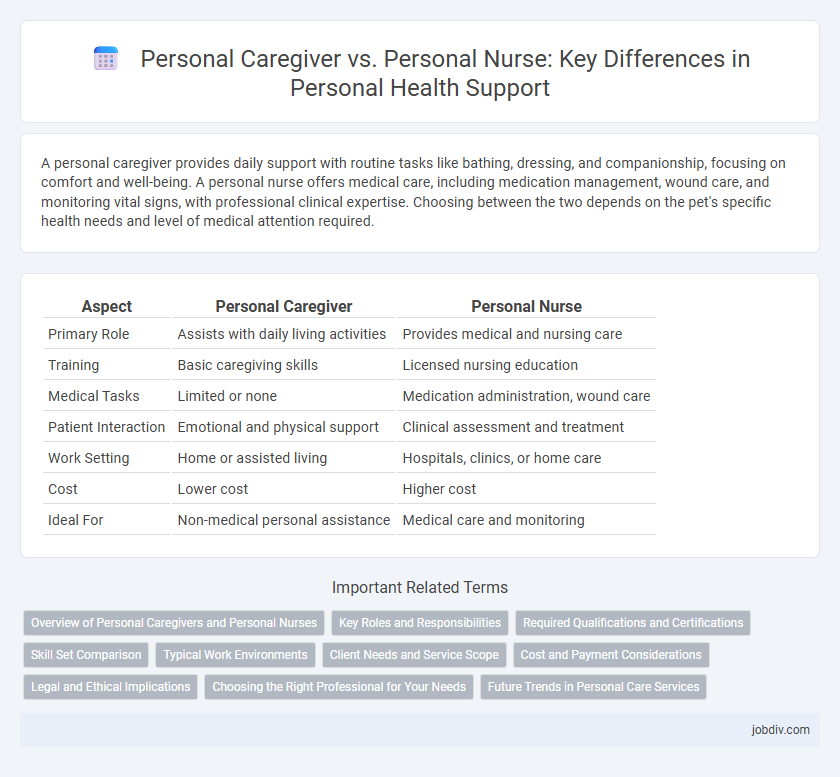A personal caregiver provides daily support with routine tasks like bathing, dressing, and companionship, focusing on comfort and well-being. A personal nurse offers medical care, including medication management, wound care, and monitoring vital signs, with professional clinical expertise. Choosing between the two depends on the pet's specific health needs and level of medical attention required.
Table of Comparison
| Aspect | Personal Caregiver | Personal Nurse |
|---|---|---|
| Primary Role | Assists with daily living activities | Provides medical and nursing care |
| Training | Basic caregiving skills | Licensed nursing education |
| Medical Tasks | Limited or none | Medication administration, wound care |
| Patient Interaction | Emotional and physical support | Clinical assessment and treatment |
| Work Setting | Home or assisted living | Hospitals, clinics, or home care |
| Cost | Lower cost | Higher cost |
| Ideal For | Non-medical personal assistance | Medical care and monitoring |
Overview of Personal Caregivers and Personal Nurses
Personal caregivers primarily assist individuals with daily living activities such as bathing, dressing, and meal preparation, focusing on non-medical support. Personal nurses provide clinical care, including medication administration, wound care, and health monitoring, typically requiring formal nursing education and licensure. Both roles enhance quality of life but differ in medical responsibility and training requirements.
Key Roles and Responsibilities
Personal caregivers primarily assist with daily living activities such as bathing, dressing, and meal preparation, while personal nurses provide advanced medical care including medication administration, wound care, and health monitoring. Caregivers offer emotional support and companionship, focusing on enhancing comfort and safety, whereas nurses assess medical conditions, develop care plans, and coordinate with physicians for treatment adjustments. Both roles are essential in patient care but differ significantly in scope and medical expertise.
Required Qualifications and Certifications
Personal caregivers typically require a high school diploma and completion of specialized training programs, such as CPR certification and first aid, but do not always need licensure. Personal nurses must hold a registered nurse (RN) license, requiring a nursing degree and passing the NCLEX-RN exam, along with maintaining state-mandated continuing education. Certifications for personal nurses may include advanced cardiac life support (ACLS) and specialized clinical skills depending on patient needs.
Skill Set Comparison
Personal caregivers provide support with daily living activities, including bathing, dressing, meal preparation, and companionship, requiring strong interpersonal and organizational skills. Personal nurses possess advanced clinical expertise, such as administering medications, managing wound care, monitoring vital signs, and implementing treatment plans, demanding comprehensive medical training and certification. The skill set difference primarily lies in caregivers focusing on non-medical aid and emotional support, whereas nurses handle complex healthcare tasks and medical interventions.
Typical Work Environments
Personal caregivers commonly work in private residences, assisted living facilities, and group homes, providing non-medical support such as daily living assistance and companionship. Personal nurses typically operate in clinical settings like hospitals, nursing homes, and outpatient care centers, delivering comprehensive medical care including medication management and wound treatment. Both roles require adaptability to diverse environments, but personal nurses engage in more medically intensive contexts.
Client Needs and Service Scope
Personal caregivers provide essential non-medical support such as assistance with daily living activities, companionship, and basic hygiene care tailored to clients requiring help with routine tasks. Personal nurses offer specialized medical care including medication management, wound dressing, and monitoring of chronic conditions for clients with complex health issues. The scope of service is determined by client needs, where caregivers support functional independence, and nurses address clinical healthcare requirements.
Cost and Payment Considerations
Personal caregivers typically cost less than personal nurses, with rates averaging $15 to $25 per hour compared to $30 to $50 per hour for nurses due to their specialized medical training. Payment for personal caregivers often comes out-of-pocket or through long-term care insurance, whereas personal nursing services may be covered partially by health insurance, Medicare, or Medicaid depending on eligibility and medical necessity. Evaluating budget constraints and insurance benefits is crucial when deciding between a personal caregiver and a personal nurse for affordable, quality care.
Legal and Ethical Implications
Personal caregivers typically provide non-medical assistance such as bathing, dressing, and meal preparation, operating under fewer legal regulations compared to personal nurses who are licensed healthcare professionals responsible for medical treatments and monitoring. Legal implications for personal nurses include adherence to healthcare laws, patient confidentiality under HIPAA, and maintaining licensure, while personal caregivers must comply with state-specific regulations regarding background checks and duty limitations. Ethical considerations for both roles emphasize respect for patient autonomy, confidentiality, and ensuring patient safety, but personal nurses face stricter ethical standards due to their medical responsibilities and professional codes of conduct.
Choosing the Right Professional for Your Needs
Choosing the right professional for your needs depends on the level of medical care required; personal caregivers provide assistance with daily activities and companionship, while personal nurses offer skilled medical support and medication management. Assessing the patient's health condition, complexity of care, and personal preferences ensures an appropriate match between caregiver services and nursing expertise. Understanding the distinctions in qualifications and responsibilities helps in making informed decisions for optimal personal care.
Future Trends in Personal Care Services
Future trends in personal care services highlight increased integration of technology, with personal caregivers utilizing telehealth tools to enhance home-based support. Personal nurses are expected to adopt advanced remote monitoring systems, enabling proactive management of chronic conditions and improving patient outcomes. Growth in personalized care plans driven by data analytics will transform both roles, ensuring tailored and efficient healthcare delivery in home environments.
Personal Caregiver vs Personal Nurse Infographic

 jobdiv.com
jobdiv.com